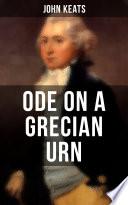Quotes from work
Ode on a Grecian Urn

"Ode on a Grecian Urn" is a poem written by the English Romantic poet John Keats in May 1819 and published anonymously in Annals of the Fine Arts for 1819 .

“Heard melodies are sweet, but those unheard, are sweeter”
Stanza 2
Poems (1820), Ode on a Grecian Urn
Variant: Heard melodies are sweet, but those unheard
Are sweeter; therefore, ye soft pipes, play on.
Source: Ode on a Grecian Urn and Other Poems
Context: Heard melodies are sweet, but those unheard
Are sweeter: therefore, ye soft pipes, play on;
Not to the sensual ear, but, more endear’d,
Pipe to the spirit ditties of no tone.
Context: Heard melodies are sweet, but those unheard
Are sweeter: therefore, ye soft pipes, play on;
Not to the sensual ear, but, more endear’d,
Pipe to the spirit ditties of no tone.
Fair youth, beneath the trees, thou canst not leave
Thy song, nor ever can those trees be bare;
Bold Lover, never, never canst thou kiss,
Though winning near the goal — yet, do not grieve;
She cannot fade, though thou hast not thy bliss,
For ever wilt thou love, and she be fair!

Stanza 5. The final lines of this poem have been rendered in various ways in different editions, some placing the entire last two lines within quotation marks, others only the statement "Beauty is truth, truth beauty," and others without any quotation marks. The poet's final intentions upon the matter before his death are unclear.
Poems (1820), Ode on a Grecian Urn

Stanza 1
Poems (1820), Ode on a Grecian Urn
Context: Thou still unravish'd bride of quietness,
Thou foster-child of silence and slow time,
Sylvan historian, who canst thus express
A flowery tale more sweetly than our rhyme:
What leaf-fringed legend haunts about thy shape?
Of deities or mortals, or of both,
In Tempe or the dales of Arcady?
What men or gods are these? What maidens loth?
What mad pursuit? What struggle to escape?
What pipes and timbrels? What wild ecstasy?